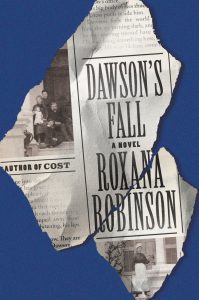Making Sense of Family History
 “Robinson bases her formidable novel on the lives of her great-grandparents, exposing the fragile and horrific state of affairs in the American South two decades after the end of the Civil War…. Robinson’s descriptive and imaginative prose sings; this book is a startling reminder of the immoral and lasting brutality visited on the South by the institution of slavery.”
“Robinson bases her formidable novel on the lives of her great-grandparents, exposing the fragile and horrific state of affairs in the American South two decades after the end of the Civil War…. Robinson’s descriptive and imaginative prose sings; this book is a startling reminder of the immoral and lasting brutality visited on the South by the institution of slavery.”
—Publishers Weekly
My most recent book is the biographical novel, Dawson’s Fall. It’s about my great-grandparents, Frank and Sarah Dawson, who lived in Charleston, South Carolina, after the Civil War. Since I’m a biographer (Georgia O’Keeffe) as well as a novelist, I was determined to keep to the facts. I wanted the book to stand as a historical record as well as a novel.
The historical record was already substantial: Frank and Sarah were both writers. Frank was the founder and editor of The Charleston News and Courier. He wrote editorials and a memoir, Reminiscences of a Confederate Soldier. Sarah’s Civil War journals were published as A Confederate Girl’s Diary, and she wrote essays for Frank’s newspaper. Her brother, James Morgan, published a memoir, my grandmother Ethel wrote an unpublished one, and my great-uncle Warrington wrote reminiscences. Everyone in both families wrote letters, hundreds of which survive. I had an enormous amount of family material.
So I knew a lot about the relationship between Frank and Sarah. Frank fell in love with her at first sight, but Sarah had decided never to marry. He was determined. The courtship was long, much of it carried out by mail: he lived in Charleston, she, outside Columbia. She kept his letters, but he didn’t keep hers, so I had to infer what she had said from his responses. Sometimes it was difficult. Why, on August 5, 1873, did he write a solemn letter, referring to the date and declaring that he had proved his affection? They had met in September, and in December he’d asked permission to write to her. But why was that August date so important?
There was a larger mystery: after a decade of happy marriage, why did Sarah and the two children leave Frank to live in Europe for two years?
In February, 1886, Frank and the family set off, first to London, to visit his family (he was English), then to Paris. There Frank settled them in as paying guests of an aristocratic French family, friends of friends. The children were enrolled in school: Ethel at the Convent of the Sacred Heart, her younger brother, Warrington, at the Brothers Ecole St. Guillaume, now St. Thomas Aquinas Parish School. Frank went on to Rome for an audience with the Pope; on the way back Frank visited his family before leaving for South Carolina. The stay in Paris was short: the children got bronchitis, and the aristocratic landlord was dictatorial. Sarah moved to Lausanne, and put the children in school there. Frank visited, but they remained in Switzerland until September, 1888. Then they came home, bringing with them a French-speaking Swiss girl, Marie-Helene Burdayron.
But why had they gone? A two-year separation was a strange choice for a devoted couple. Was there something I didn’t know about the marriage? Did Frank have a mistress? Did Sarah have a lover? Had they argued irrevocably? But Frank wrote long loving letters, and sent them all presents at Christmas. He was tender and supportive. Why were they living on different continents?
At last I figured it out: this was about education, not marriage. Sarah Morgan had grown up in Baton Rouge. In the deep south, the land-owning gentry lived far from schools, and many children were taught at home, by members of their extended family. Sarah’s family was highly educated. Her father was a scholarly judge; two brothers studied law, another, medicine. Her family was fluent in French because everyone in Baton Rouge spoke it – Louisiana had been a French colony. Sarah herself was extremely well-read. As a young woman she studied each morning, then gave lessons to nieces and nephews. But she had only attended an actual school once, for only ten months.
Frank’s education in England had been very different. From an old Catholic family, he had gone to a famously rigorous Catholic boarding school, St. Mary’s, from the age of eight until his late teens. There he learned Latin and Greek, as well as fluent French.
Now the story became clear: Frank wanted his children to have the same experience he’d had. He wanted them raised as Catholics, and fluent in French. In America there were few rigorous Catholic schools that taught fluency in French, so Frank wanted to send the children to boarding schools in France. Sarah, who had never left her family even to go to day school, refused to send them so far away, alone. Both believed devoutly in the value of education. This was the compromise: the children would go to France and Sarah would go with them. She would bring back a French-speaking girl, so the family could speak the language at home.
I was relieved to know that I didn’t have to search for a secret rift in the marriage. The explanation was right in front of me, all I had to do was put the pieces of the puzzle together correctly.
That solemn letter in August? It must have been exactly six months from Frank’s original proposal. Sarah turned him down, but gave him six months to win her heart, and prove that his love was not “a mere fancy.” On the chosen day he asked her again to marry him. “I only wish, on this day of all days… to repeat to you, solemnly, my vows of constant and unselfish love. I have proved to you that I understand you,” he wrote. “My one aim in life is to win your hand.”
We don’t have the letter she wrote in reply, but here I am, their great-grandchild. Some things you can deduce from results.
—
Roxana Robinson is the author of ten books – six novels, three collections of short stories, and the biography of Georgia O’Keeffe. Four of these were chosen as New York Times Notable Books , two as New York Times Editors’ Choices.
Her fiction has appeared in The New Yorker, The Atlantic, Harper’s, Best American Short Stories, Tin House and elsewhere. Her work has been widely anthologized and broadcast on NPR. Her books have been published in England, France, Germany, Holland and Spain. Robinson is a scholar of American paintings and an environmentalist, and her essays, criticism and Op-Eds have appeared in The New York Times, The

International Herald Tribune, The Chicago Tribune, The Philadelphia Inquirer,The Washington Post, Bookforum, The Nation and elsewhere. She has twice been a finalist for the Balakian Award for Criticism from the NBCC.
Her novel, Cost, won the Maine Writers and Publishers Alliance Fiction Award for 2008, and it was listed as one of the Best Books of the Year by the Chicago Tribune, Library Journal, The Seattle Times and The Wall Street Journal. It was named one of the Five Best Fiction Books of the Year by The Washington Post.
Her novel, Sparta, won the Maine Fiction Award, the James Webb Award from the USMCHF, was named one of the Ten Best Books of the Year by the BBC, and was short-listed for the Dublin Impac Award.
Roxana Robinson has received fellowships from the NEA, the MacDowell Colony and the Guggenheim Foundation, and she was named a Literary Lion by the New York Public Library. Robinson has served on the Boards of PEN and the Authors Guild, and was the president of the Authors Guild from 2013-2017. In 2019 she received the Barnes and Noble “Writers for Writers Award,” given by Poets and Writers.
Find out more about her on her website https://www.roxanarobinson.com/
ABOUT DAWSON’S FALL
A cinematic Reconstruction-era drama of violence and fraught moral reckoning
In Dawson’s Fall, a novel based on the lives of Roxana Robinson’s great-grandparents, we see America at its most fragile, fraught, and malleable. Set in 1889, in Charleston, South Carolina, Robinson’s tale weaves her family’s journal entries and letters with a novelist’s narrative grace, and spans the life of her tragic hero, Frank Dawson, as he attempts to navigate the country’s new political, social, and moral landscape.
Dawson, a man of fierce opinions, came to this country as a young Englishman to fight for the Confederacy in a war he understood as a conflict over states’ rights. He later became the editor of the CharlestonNews and Courier, finding a platform of real influence in the editorial column and emerging as a voice of the New South. With his wife and two children, he tried to lead a life that adhered to his staunch principles: equal rights, rule of law, and nonviolence, unswayed by the caprices of popular opinion. But he couldn’t control the political whims of his readers.
As he wrangled diligently in his columns with questions of citizenship, equality, justice, and slavery, his newspaper rapidly lost readership, and he was plagued by financial worries. Nor could Dawson control the whims of the heart: his Swiss governess became embroiled in a tense affair with a drunkard doctor, which threatened to stain his family’s reputation. In the end, Dawson―a man in many ways representative of the country at this time―was felled by the very violence he vehemently opposed.
Category: On Writing
























